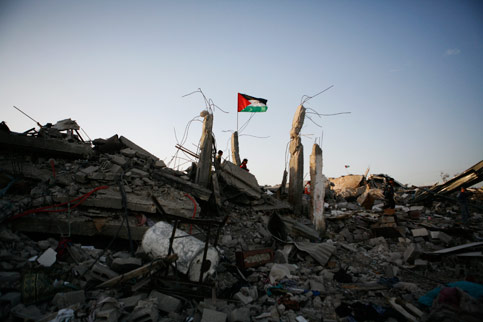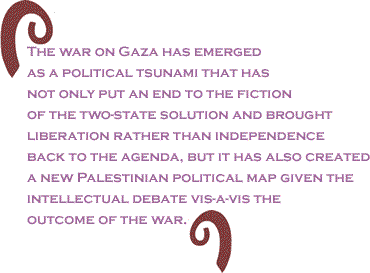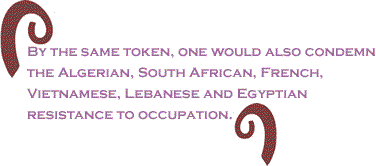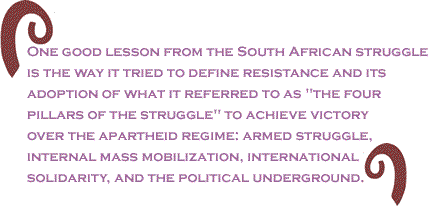
|
|||||||||||||||||||||||

|
|

Custom Search
|
|
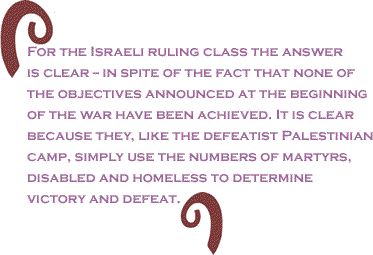 |
|
The
ongoing bloodletting in the Gaza Strip and the ability of the Palestinian
people to creatively resist the might of the world's fourth strongest
army is being hotly debated by Palestinian political forces. The
latest genocidal war which lasted 22 days, and in which apartheid
Israel used F-16s, Apache helicopters, Merkava tanks and conventional
and non-conventional weapons against the population, have raised
many serious questions about the concept of resistance and whether
the outcome of the war can, or cannot, be considered a victory for
the Palestinian people. The same kind of questions were raised in
2006 when apartheid Israel launched its war against the Lebanese
people and brutally killed more than 1,200 Lebanese. At
the beginning of the Gaza war, we were told by certain sectors of
the Palestinian political leadership that "the two sides are
to blame: Hamas and Israel" and that "Hamas must stop
the launching of the rockets from Gaza." Resistance in all
its forms, violent and otherwise, was considered, by these same
people, "futile." Now that there are fewer bombs raining
down on Gaza, the conflict focuses on whether the outcome of the
war was one of victory or defeat. For the Israeli ruling class the
answer is clear -- in spite of the fact that none of the objectives
announced at the beginning of the war have been achieved. It is
clear because they, like the defeatist Palestinian camp, simply
use the numbers of martyrs, disabled and homeless to determine victory
and defeat. This
approach fails to acknowledge that none of the so-called "objectives"
of the war have been achieved: Hamas is still in power; rockets
are still being launched; no pro-Oslo forces have been reinstated
in the Gaza Strip. The question now being raised by some Palestinian
intellectuals and political forces, after the (un)expected brutality
of the Israeli occupation forces, is "was it worth it?"
The "it" here remains ambiguous depending on the reaction
of the listener/reader. What is of interest here is the radical
change that some national forces, especially the left and their
intellectuals, have gone through in their mechanical, as opposed
to dialectical, interpretation of history and their role, thereafter,
in its making. The
war on Gaza has emerged as a political tsunami that has not only
put an end to the fiction of the two-state solution and brought
liberation rather than independence back to the agenda, but it has
also created a new Palestinian political map given the intellectual
debate vis-a-vis the outcome of the war. This new classification
of the Palestinian intelligentsia and ruling classes has led to
many ex-leftists joining the right-wing anthem of Oslo and its culture
of defeatism. Not unlike the Oslo intelligentsia, the new pragmatic
left is characterized by demagogy, opportunism and short-sightedness.
The conduct of these NGOized intellectuals (those emerging from
western-funded "nongovernmental organizations" -- NGOs)
does not show any commitment to their national and historical responsibility. Michel
Foucault's famous formulation, "where there is power, there
is resistance," helps us to theorize the political and, hence,
the cultural resistance, represented in some of the (post)war discourse.
Within the context of resistance, it is worth quoting Frantz Fanon's
definitions of the role of the "native intellectual" during
the "fighting phase": "[T]he native, after having
tried to lose himself in the people and with the people, will ...
shake the people ... [H]e turns himself into an awakener of the
people; hence comes a fighting literature, and a national literature."
On
the other hand, there are intellectuals who, according to Fanon's
theorization, "give proof that [they] [have] assimilated the
culture of the occupying power. [Their] writings correspond point
by point with those of [their] opposite numbers in the mother country.
[Their] inspiration is European [i.e. Western] ..." Hence the
adoption of the Israeli narrative by some intellectual sections,
including NGOized leftists, whereby Israel was exonerated of its
crimes: "we are to blame for what happened;" "we
were not consulted when Hamas started the war!" and "the
people are paying the price, not the resistance movement;"
"Hamas should have renewed the truce;" "we cannot
afford to lose so many lives; Hamas should have understood this;"
"there was no resistance at all on the streets of Gaza; resistance
men ran away as soon as they saw the first tank." By
the same token, one would also condemn the Algerian, South African,
French, Vietnamese, Lebanese and Egyptian resistance to occupation.
The same logic was used by the Bantustan chiefs of South Africa
against the anti-apartheid movement, by the Vichy government of
France, the South Vietnamese government, the reactionary Egyptian
Forces against the progressive regime of Gamal Abdel Nasser in 1956,
and even by the Siniora-Jumblatt-Geagea-Hariri March 14 coalition
in Lebanon in 2006. Obviously,
these intellectuals' assimilation of the Western mentality, through
a process of NGOization, and hence Osloization, makes them look
down upon the culture of resistance as useless, futile and hopeless.
Resistance, broadly speaking, is not only the ability to fight back
against a militarily more powerful enemy, but also an ability to
creatively resist the occupation of one's land. The Oslo defeatists
and the neo-left camp fail to use people power creatively or even
to see that it exists. They are defeated because they want to fight
the battle on Israel's terms -- through the adoption of an Israel-Hamas
dichotomy, rather than apartheid Israel vs. the Palestinian people
-- instead of looking at their strengths: that they are the natives
of the land, they have international law supporting their claims,
they have the moral high ground, the support of international civil
society, etc. One
good lesson from the South African struggle is the way it tried
to define resistance and its adoption of what it referred to as
"the four pillars of the struggle" to achieve victory
over the apartheid regime: armed struggle, internal mass mobilization,
international solidarity, and the political underground. Alas, none
of these pillars seem to fit within the paradigm of the Palestinian
neo-left. The
principled critical legacy of the likes of Ghassan Kanafani, Edward
Said and Frantz Fanon is no longer the guiding torch of the NGOized
left -- the secular democratic left which is supposed to be, as
Said would argue, "someone who cannot easily be co-opted by
governments or corporations [or donors], and whose raison d'etre
is to represent all those people and issues that are routinely forgotten
or swept under the rug." A fascinating, and timely, remark
by Hungarian philosopher George Lukacs points the way that the NGOized
left should be talking right now: "When the intellectual's
society reaches a historical crossroads in its fight for a clear
definition of its identity, the intellectual should be involved
in the whole sociopolitical process and leave his ivory tower." Decolonizing
cultural resistance insists on the right to view Palestinian history
as a holistic entity, both coherent and integral. It also reflects
a national and historical consciousness that Palestinians are able
to be agents of change in their present and future regardless of
the agendas of western donors, the Quartet and other official "international"
bodies. Yet we see that the neo-democrats of Palestine are unable
to acknowledge Palestinian agency because they refuse to respect
the will of the people as expressed through the ballot box. This
position is meant to synergize with that of their donors and international
bodies who have worked hard over the last two years to delegitimize
Palestinian agency.
This
lack of political consciousness and the search for individual solutions
-- the major characteristics of defeatist ideology -- contradict
the collective national reality of the colonized Palestinians. Political
consciousness must begin with a rejection of the conditions imposed
by the Israeli occupation and the Quartet (Russia, the United States,
the United Nations and the European Union) on the majority of Palestinians
and even more crucially, a rejection of the crumbs that are offered
as a reward for good behavior to a select minority of Palestinians.
Indeed, class consciousness is dialectically related to the struggle
for national liberation. It is the interests of some NGOized groups,
ex-leftists, and neo-liberals, whose defeatist perspective on the
outcome of Gaza 2009 is being disseminated with the help of some
unpopular media outlets, which is at stake here -- not the interests
of the Palestinian people who have gained even more legitimacy through
their steadfast resistance to the Israeli bombardment. Osloized
and NGOized classes argue that the only solution to the Israeli-Palestine
conflict is the establishment of two states which basically means
the creation of an independent Palestine on 22 percent of Mandate
Palestine. They maintain that the only way to reach independence
is through negotiations, though more than ten years of negotiations
have not moved the Israeli position at all. The establishment of
a Palestinian state is not mentioned in any of the clauses of the
Oslo agreement, thus leaving the matter to be determined by the
balance of power in the region. This balance tilts in favor of Israel,
which rejects the establishment of a sovereign Palestinian state,
in spite of its recognition of the Palestinian people and its national
movement the Palestine Liberation Organization (PLO). No Israeli
party, neither Labor, Likud nor Kadima is ready to accept a Palestinian
state as the expression of the right of the Palestinian people to
self-determination. The impasse negotiations have reached has proven
the oppositional camp correct. Hence
the "shocking" results of the 2006 elections, in which
Hamas won the majority of the seats of the Palestinian Legislative
Council. Both liberals and leftists were "surprised" and
even felt "betrayed!" Accusations of the "immaturity"
and even "backwardness" of the Palestinian people have
been thrown around since then. Nothing was mentioned about the failure
of "the peace process;" nor the end of the two-state solution,
and thereafter, the necessity and need for a new national program
that can mobilize the masses; a program that is necessarily democratic
in its nature; one that respects resistance in its different forms
and, ultimately, guarantees peace with justice. It
is this lack of a political vision and a clear-cut ideological program
that allows for the contortions of the Osloized classes. It is this
lack that makes it prepared to recognize a "Jewish state"
alongside a Palestinian state, including the legitimization of discriminatory
practices applied by Israel against its non-Jewish, i.e. mainly
Palestinian citizens and residents since 1948, and the end of the
right of return of more than six million of refugees. What we are
constantly told, is either accept Israeli occupation in its ugliest
form -- i.e. the ongoing presence of the apartheid wall, colonies,
checkpoints, zigzag roads, color-coded number plates, house demolitions
and security coordination supervised by a retired American general
-- or have a hermetic medieval siege imposed on us, but still die
with dignity. The first option seems to be the favorite of some
NGOized "activists."
The
new, much-needed program, however, must make the necessary link
between all Palestinian struggles: the occupation of Gaza and the
West Bank, Israel's ethnically-based discrimination and rights violations
of more than one million Palestinian citizens, and the 1948 externally
displaced refugees. Gaza 2009 was not a defeat but a victory, because
in Gaza the Israelis shot the two-state solution in the head; it
is a victory achieved with the blood of those children, men and
women who sacrificed their lives so that we could live and continue
to resist, not surrender. Those Palestinians that are mourning the
demise of the two-prison solution are out of step with new facts
on the ground: there can be no going back to fake solutions and
negotiations; it is time for a final push to real freedom and statehood.
They can join other Palestinians, and internationals, in their demand
for a secular, democratic state in Mandate Palestine with equality
for all or they can walk into the dustbin of history. BlackCommentator.com
Guest Commentator, Dr. Haidar Eid is an independent political commentator and activist
residing in Gaza. Click here
to contact the Electronic Intifada |
|
Any BlackCommentator.com article may be re-printed so long as it is re-printed in its entirety and full credit given to the author and www.BlackCommentator.com. If the re-print is on the Internet we additionally request a link back to the original piece on our Website. Your comments are always welcome. eMail re-print notice
If you send us an eMail message we may publish all or part of it, unless you tell us it is not for publication. You may also request that we withhold your name. Thank you very much for your readership. |
|
| |
|
| February
12, 2009 Issue 311 |
|
| Executive Editor: Bill Fletcher, Jr. |
| Managing Editor: Nancy Littlefield |
| Publisher: Peter Gamble |
| Est. April 5, 2002 |
Printer Friendly Version
in resizeable plain
text format or pdf
format. |
| Frequently Asked Questions |
 |

|
 |
 |
 |
| |
| |





























